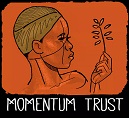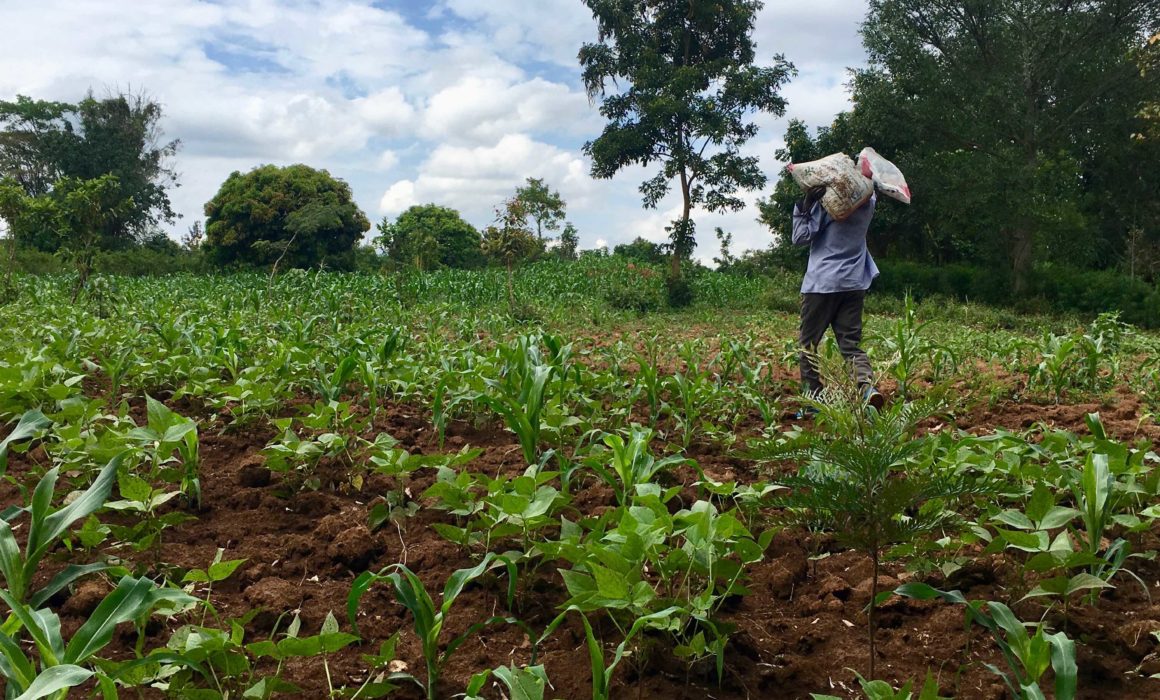Last year, I took a big decision: I decided to spend five months in Kenya working for Momentum Trust as their intern on the ground. Looking back on that experience, I realize how much I have learned. What rests with me as the greatest lesson is how a challenging environment can be a stimulator for growth and innovation – at both an organisational and personal level.
As a Master’s student of International Development focusing on the African region, I sought to get a field experience in order to see and feel in practice part of what I was studying. Coming across Momentum Trust, I regarded it as a good opportunity to better understand how social enterprises operate on the ground. I knew it would be a challenging experience: to live 5 months in a village in Western Kenya as the only foreigner.

Faith and Washington, my two colleagues working on the chia activities, posing with me after a farmers meeting
I came back around six months ago, and I can say for sure that it was the most challenging experience in my life. At times it was frustrating, and I was questioning why I was there. I realised how difficult it can be to be the only foreigner in a small community and how challenging work can be for a small organisation as Momentum. But all these challenges also have a positive side: I experienced how challenges can be fuel for growth. With Momentum, I saw how great challenges and difficulties boosted the organisation’s entrepreneurial spirit and paved the way for innovative solutions. Personally, I had to adapt to a new context with unforeseen challenges. I grew immensely as a person; giving up my need for planning and organizing everything, and gaining new perspectives on life interacting with my local colleagues and Momentum’s farmers.
In the following, I seek to illustrate some of these challenges and how I experienced that Momentum and myself grew and developed.
How the challenge of no rain fostered Momentum’s entrepreneurial spirit
In 2016, Kenya was hit by a drought. After my first day at work in August 2018, I came to understand that this drought was still having an impact on the maize farmers. I daily heard people referring to it and how it had ruined their harvests and caused hunger. Many of the farmers still struggled to get their farming business back on track after its devastating consequences.
Because the drought overturned the farmers’ business it also impacted Momentum. Momentum provides farmers with loans to support their farming. The organisation thus depends on the farmers having a good harvest to be able to repay. But the drought gave the farmers small outputs if any at all. In fact, most had hardly had enough to feed their families. The drought became a threat to the survival of the organisation – Momentum’s business model was simply not financially sustainable when that many farmers were unable to repay. In order to secure its survival, the organisation applied one of its greatest forces: its entrepreneurial spirit – allowing the organisation to innovate new activities to overcome the challenges.
When I arrived, the organisation was about to roll out a whole new activity concerning chia seeds. Farmers were given chia seeds and trainings, and Momentum bought their final output. Chia seeds are relatively easy to grow and a cash crop with a stable market. It is highly nutritional and hence valuable in an area marked by problems of malnutrition.

My collegeague Faith standing among chia plants
It became clear to me how the challenges and difficulties brought by the devastating drought spurred Momentum’s entrepreneurial spirit with space to innovate and develop, to adapt to unforeseen and apparently insurmountable challenges. I was impressed by not only how the organisation had turned itself around, but also by the farmers. Everyday they wake up to hard labour at their farms in an uncertain environment always dependent on the rainfall. Their openness and eagerness to test chia and work with Momentum was for me a clear indication of their determination to work their way out of the challenges.
Giving up my need to plan and hurry
I am a planner. I schedule my days and I usually strive to be effective and as efficient as possible in my work and studies. There’s no doubt that Kenya shook that out of me – at least partly. For instance, the very first day I needed a sim-card, and one of my colleagues offered to help. We both expected it to be a quick 30 min trip to a shop. But setting out in the morning, I was not back in the village before dusk, as we had to travel to a much bigger town. And on the way my colleague had to work: visiting farmers to collect and pack chia seeds. I never expected getting a sim-card would take all day and involve visiting farmers, packing chia seeds and hanging out with cute piggies. I felt completely thrown into Kenyan life right away having to let go of my need to control.

On my way to the sim card shop, I spent some time hanging out with piggies, while my colleague met with farmers
Two days later, I was with the field officers visiting a group of maize farmers. We were sitting under a huge tree in plastic chairs. All of a sudden, it started to drip and soon it was pouring down. We were 15 people and had to cram together in the farmer’s small living room. I was siting tightly in between others on a small couch. We could hardly talk as the rain hit the tin roof loudly. I understood none of the conversation as everything was conducted in Luo (the local language). Everything took so long. At the countryside the conception of time is far from what I am used to in Europe. I never saw anyone hurrying here, and I had to learn to slow down. In the moment, I felt of no use and as if I was wasting my time. We had to drive back on the boda boda (motorbike) on the dirt roads that become very slippery in the rain. I was certain it would end wrong. Luckily we didn’t crash and I made it home all soaked feeling like I had an extremely inefficient day. I started asking myself what I was doing here.

A typical view of a farmer meeting with my two colleagues, Caleb and Paul, sitting in the front
It took me a while, but eventually I learned to develop and adapt to these challenges. I figured out how to contribute and be of use workwise. I started working on various communications tasks for Momentum and to develop our results report. This required interviews with the farmers and pictures. My colleagues helped me with translating and to collect the data I needed for the report. In addition, all these visits came to mean so much for my understanding of the work of Momentum and the famers’ lives. Even though I often felt useless in the moment, I gained so much perspective on the everyday-life of the farmers seeing their homes, interviewing them and meeting their families. At the same time, I got closer to my colleagues understanding how their daily workdays go.

I did many interviews with farmers for our results report. Some farmers spoke English well enough, but my colleagues were always ready as translators
Face to face with the many sides of Kenyan life
At the countryside, I felt how I developed as a person. I became more patient in my work, more flexible and I became ready to expect the unexpected and to change my plans along the way. For instance, it all of a sudden made sense that I moved to Nairobi to work with some new potential partner organisations. I had expected myself to stay the entire internship at the countryside. But halfway through, I all of a sudden found myself in the bustling capital.

Westlands in Nairobi – one of Nairobi’s more affluent neighbourhoods
The life of Kenyans in Nairobi is entirely different to life at the countryside. First of all, everything goes at a much faster pace – people are concerned about their time. There are no dirt roads and even though traffic is often stuck, you can always advance fast on a boda boda (motorbike). Here you see skyscrapers, lavish malls and people in fancy business suits. Once again, I felt like my world was turned upside down and I had to adapt to a new reality.
I finished my internship going back to the countryside to say goodbye to my colleagues. The bus ride from Nairobi out there is stunning passing through Rift Valley with its beautiful lakes and highlands, passing plains with zebras, tea plantations, and all the small towns with vibrant markets. I did this travel several times, and each time I came to appreciate how diverse and rich a country Kenya is – both in terms of geography and its people. Adapting to these foreign environments and to define my work was for me great challenges. It made me realise and experience how one can turn challenges into the fuel for growth.
/Astrid Melchior Olesen, intern from August 2018 to January 2019

